-
Evergreen Life DNA Test
review on 4 October 2018
by Rebecca Fishwick

At a Glance
Summary
I was impressed by the depth and range of information provided by Evergreen Life’s genetic health reports. For each result, I was told which genetic variants I had that influenced it, and references to the scientific journals they had used were supplied.
The results I had were consistent with other genetic health tests I’ve taken, and most were consistent with what I know of myself. For fitness, nutrition, or skincare enthusiasts, they seemed well worth the investment. I would recommend buying the four tests together (unless you are only interested in the skincare section, for example) in order to get maximum value and data for your money.
Full Description
Evergreen Life was founded in 2014 with the aim of providing individualised healthcare. Based in Manchester, Evergreen Life seeks to empower individuals through “people-powered health”, giving them control of their health information through their app.
Product Expectations
Before taking the Evergreen Life DNA test, I went to the website to learn more about their health app. I was surprised to see that the DNA test only formed part of the app. I could also use it to keep track of my health and fitness, view my personal health record, book appointments with my GP, order repeat prescriptions, view test results, log a medication diary with reminders, and share health information with my GP.
I learned that Evergreen Life was approved by the NHS, and so it was possible for me to download my medical record using a Linkage Code and Account ID from my GP. Certain practices would also allow me to book GP appointments and order repeat prescriptions, and view my results for medical tests through the app. I could even share my medical information with carers, health professionals, and loved ones.
I would also be able to input my own personal health data into the Evergreen Life app. I could log allergies and medications, record my heart rate and blood pressure, and provide my body fat percentage and waist to hip ratio. I could share this personal health record with my practitioner to ensure the healthcare I get is as personalised and informed as possible.
To find out more about their DNA test, I went to the “DNA Testing” section of their site. I found that they offered four DNA tests for Diet, Metabolism, Fitness and Skin, or a bundle package of all four tests, which came with a substantial discount.
I planned to take all four DNA tests, so I looked at the information for all of them.
The ‘Diet’ test, I learned, would analyse my DNA to discover what kind of diet would work best for me, according to my genes. I would learn which vitamin deficiencies I may be prone to, whether I’m disposed to prefer sweet or savoury foods, how I metabolise caffeine, whether I’m likely to be lactose intolerant, and whether I’m likely to get the “alcohol flush” reaction.
Their ‘Metabolism’ test would reveal how my metabolic rate affects my diet and lifestyle. It would tell me how I digest fats, how my DNA affects my weight and BMI, how age my affect my metabolism, how I breakdown carbohydrates, and what my cholesterol levels are likely to be like.
The ‘Fitness’ test would provide insights into my genetic fitness, such as whether I’m better disposed to strength or endurance training, my recovery rate after exercise, how my body builds muscle and strength, how I can best lose weight through exercise, and whether High Intensity Interval Training (HIIT) is right for me.
The ‘Skincare’ would reveal insights into my skin to help me care for it better. These insights would include sun sensitivity, anti-ageing information, whether I’m disposed to dry skin, stretch marks and cellulite, and how my skin tans.
Ordering Experience
Ordering through the Evergreen Life website was very easy. The shipping was free, and I was told to allow eight weeks for my results to be processed. I could pay using a PayPal account, or a credit/debit card.
The kit arrived a couple of days after ordering, and resembled the one I’d seen pictured on the site. It came with clear instructions, and pictures showing me how to take the cheek swab sample (which was quick and pain-free).
Once I’d taken my sample and filled in the Test Requisition Form, I sealed both in the prepaid, pre-labelled first-class packet, and sent it back to Evergreen Life.
It hadn’t been necessary to register my kit online before returning, and I wondered how my DNA results would be linked to the app. I found that I could register online, though I couldn’t see how to link to my DNA kit. I downloaded the app, and after logging in with the account I’d created, I was able to link to my DNA kit and track its progress by going to “My DNA”.
The Results
About a month after the lab received my sample, I got an email confirming my results were in. This contained instructions for downloading the app and linking my genetic data. Since I’d already done this, I opened the app and found my results ready and waiting for me.
In the “My DNA” section (there were other sections to do with connecting with my GP and monitoring my health, though I’ll only be reviewing the DNA section here) there were four main categories for each of the four tests: Diet, Metabolism, Fitness, and Skincare.
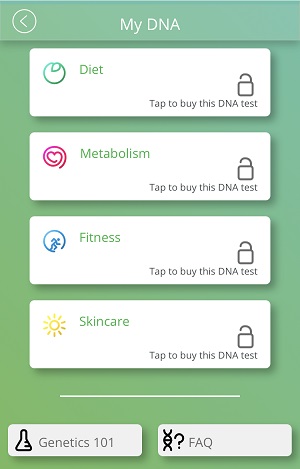
The My DNA section of the Evergreen Life app.
Results Section: Diet
I looked through my Diet results first. My results were given as a series of traits, such as lactose tolerance, caffeine consumption and metabolism, perception of bitter tastes and salt craving, sugar craving, tendency to overeat, and vitamin deficiencies.
The first result I looked at was “Alcohol flush reaction”. Most people know whether or not they have this reaction, and so it was easy to judge the accuracy of this result. I was told I was unlikely to flush, which I knew was the case (shown below).
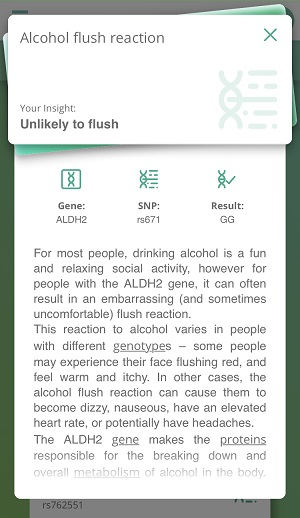
One of my Diet DNA results: Alcohol Flush Reaction.
As you can see, Evergreen Life told me which gene they had looked in, which variant within the gene (SNP, or Single Nucleotide Polymorphism), and what my genotype was for this variant – in this case GG, which was not associated with the alcohol flush reaction.
At the bottom of each result there was a “References” tab, which I could expand to view the different academic studies they had used to produce their results. Knowing that my genetic results were based on real scientific studies made me feel more confident in their findings.
Interestingly, I found that how we perceive bitterness is linked to salt craving, and I had the genetic variant linked to a greater sensitivity to bitterness, which was also linked to increased salt craving. Both are definitely true for me! In the information, I read that scientists theorised that people who are more sensitive to bitterness (which has an evolutionary advantage in avoiding poisonous substances) may crave salt to mask bitter tastes.
My caffeine-related results also rang true. I saw that my genes were linked to increased caffeine consumption, which I probably drink way too much of, and fast caffeine metabolism, which I probably have, since I don’t have much of a reaction to caffeine.
I next looked at my result for lactose intolerance, and was surprised to see I was likely to be intolerant (though I don’t think I am!). In the information, I read that environmental factors may play a part in whether or not a person becomes lactose intolerant. Curious, I looked it up, and discovered that adults have less of the lactase enzyme (the enzyme that breaks down lactose, a sugar found in cow’s milk) than babies, and that people with a very low level of this enzyme are lactose intolerant, and that adults can become gradually less tolerant to lactose – which I hope won’t happen to me!
I also found I was unlikely to overeat, which could be the case. I can’t stand eating when I’m already full, but I have a fast metabolism so I eat pretty much all the time!
For the vitamin results, I mostly had no risk of deficiency, except for B12, B6 and D – which were results I’d had from another test, though I’ve never had my blood serum levels checked, so I’m not sure if I actually am deficient in any of these vitamins!
They also provided nutritional recommendations for getting enough of these vitamins in my diet. For instance, for my vitamin D result, it was recommended I eat plenty of fish, eggs, and fortified cereals, and also ensure I consume enough calcium.
Results Section: Metabolism
My Metabolism results didn’t hit that close to the mark, though they were consistent with other genetic health tests I’ve taken. My results told me I was likely to gain weight, that I have a reduced monounsaturated fat metabolism, and that I was likely to have a higher or typical BMI.
My metabolism is actually pretty fast, but as I said, I have received similarly confusing results from other health tests. It could be that even though I have these genes they are “switched off”, or that the research into this area needs to be more extensive – and it’s growing all the time.
Other results in this section included that I was likely to have higher levels of “bad” cholesterol, and typical levels of “good” cholesterol. I’ve received similar results before, though only time will tell how accurate they are!
My metabolism of carbohydrates and triglycerides was neutral in both cases, and I was predicted to have a typical or moderate sensitivity to saturated fats.
Again, I could tap on each of these results to learn more, and I found that often I had conflicting genetic variants making me disposed to higher or lower sensitivities or likelihoods. My overall results seemed to be some sort of average.
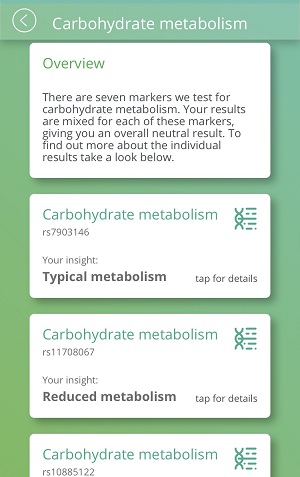
My genetic results for carbohydrate metabolism.
For instance, you can see that they tested for seven genetic markers associated with metabolism of carbohydrates, and some of my genetic variants indicated typical metabolism, while others indicated reduced metabolism. Their overall prediction was that I would have a typical carbohydrate metabolism.
Results Section: Fitness
The first result I looked at for Fitness was strength training, for which I had no natural advantage, since I have the CC variant, while people with the T variant have an advantage (shown below).
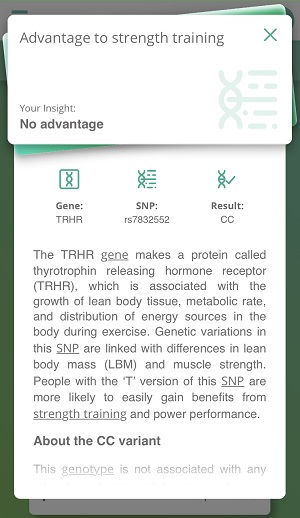
One of my Fitness results: strength training.
On the other hand, I found that I was an “effective regulator” of blood sugar for endurance exercise, that I had enhanced cardiovascular performance, increased endurance, and typical recovery after exercise. These were all pretty similar to other genetic fitness results I’ve had, and I generally prefer endurance exercise like cycling, swimming and hiking.
Other fitness results included things like inflammatory response to strength or endurance exercise, fat loss, muscle growth capability, muscle strength and injury risk. There was plenty of information for fitness enthusiasts wanting to make the best of their genetic potential.
Results Section: Skincare
The Skincare section contained genetic analyses to do with collagen degradation, risk of cellulite, risk of oxidative damage, risk of skin spots and stretch marks, skin elasticity, UV sensitivity, skin ageing, and skin moisture.
I found that along with my genetic results – such as “Average risk of dry skin” – there was additional information and recommendations for keeping my skin healthy. In the “Skin Moisture” subsection, it was recommended that people with my genotype should still take care to keep their skin moisturised, even without any increased genetic risk of dry skin (shown below).
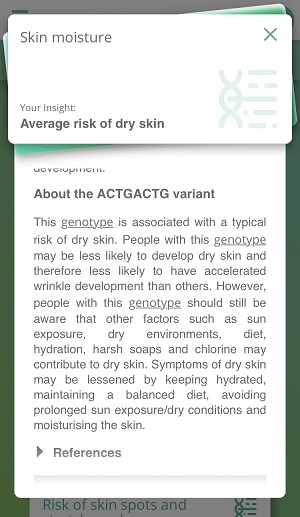
My Skincare result for skin moisture, with additional info.
Unfortunately for me, I found that I was predisposed to typical/increased skin ageing, since Evergreen had looked at several genetic markers, some indicating typical ageing, others indicating increased ageing. I thought this information could be useful to people whose results indicate increased ageing, since they can plan a skincare routine accordingly! Amongst the info provided by Evergreen Life, I found that consuming too much sugar can increase glycation, which leads to skin damage and ageing. Maintaining a balanced diet could also help prevent skin ageing.
Summary
I was impressed by the depth and range of information provided by Evergreen Life’s genetic health reports. For each result, I was told which genetic variants I had that influenced it, and references to the scientific journals they had used were supplied.
The results I had were consistent with other genetic health tests I’ve taken, and most were consistent with what I know of myself. For fitness, nutrition, or skincare enthusiasts, they seemed well worth the investment. I would recommend buying the four tests together (unless you are only interested in the skincare section, for example) in order to get maximum value and data for your money.
Please note we were invited to take this test free of charge.


